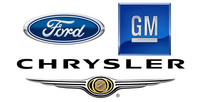White House: Looks Like We Have A Deal
 |
WASHINGTON, Dec 9, 2008; John Crawley and Thomas Ferraro writing for Reuters reported that The White House and congressional Democrats on Tuesday night reached an agreement in principle on a $15 billion proposal for bailing out U.S. automakers and forcing them to restructure or fail, officials said.
A Bush administration official and a Democratic leadership aide said the outline covered key points but final issues needed to be resolved and put in writing.
Democrats have arranged to have the House of Representatives vote on a bill as early as Wednesday and send it to the Senate for consideration.
President George W. Bush and President-elect Barack Obama were both urged by a key lawmaker to help rally support by Democrats and Republicans for the pending measure.
"Bipartisan hard work has paid off," said Democratic Sen. Carl Levin of Michigan whose home state headquarters General Motors Corp, Ford Motor Co and Chrysler LLC.
"I understand an agreement has been reached," Levin said in a statement.
The bailout is designed to allow GM and Chrysler to avert threatened bankruptcy through March with short-term loans. Ford Motor Co is not requesting immediate help but would like a line of credit in case its finances worsen.
The parties that negotiated the tentative deal agreed last week that the money would come from an Energy Department fund established in September to help Detroit make more fuel-efficient cars.
'CAR CZAR' TO MONITOR
The administration official said the negotiators satisfied the key White House concern in the talks that companies receiving aid obtain the necessary concessions and make other changes to prove they can survive and compete.
In addition to providing loans, the proposal would force automakers to answer to a presidentially appointed trustee -- or "car czar" -- and make the government their biggest shareholder.
The overseer will have powers to shape a restructuring of the companies, withholding further loans if progress toward a turnaround stalled.
A major provision would permit the czar to recommend a bankruptcy restructuring if companies borrowing money fail to obtain the necessary concessions.
Some Republicans wanted some sort of bankruptcy option included as an incentive for labor and other stakeholders to agree on givebacks.
The administration still opposes a Democratic bid to force automakers to drop lawsuits against California and other states seeking to cut auto emissions and other greenhouse gases. The administration official said it was his expectation the bill will not succeed unless that provision is struck.
Another issue raised by Republicans was the use of taxpayer money in the case of Chrysler, which is owned by private equity firm Cerberus Capital Management CBS.UL. During the talks, Democratic aides said the administration resisted a bid to hold Cerberus liable for repayment if Chrysler defaulted on any loan.
The administration official, who spoke on the condition that he not be identified because the deal had not been finalized, would not comment on specific companies so it remains unclear if that matter still needs to be cleared up.
Democrats control Congress and were expected to be able to muscle a bill through the House. But it was unclear if Republicans could stop a measure in the Senate with a procedural roadblock that requires 60 votes to clear.
"Ball is in the Senate Republicans' court," said Jim Manley, a spokesman for Senate Majority Leader Harry Reid, a Nevada Democrat. "There is no word yet whether they will give us consent."
A spokesman for Senate Minority Leader Mitch McConnell, a Kentucky Republican, said he would decline comment until he saw the bill.
MIXED EMOTIONS
An auto bailout has evoked competing emotions in Congress.
Lawmakers fear if automakers collapse, it would deepen the U.S. recession. But many say market forces, not a government saddled with a record deficit, should determine their fate.
There also is reluctance to provide another federal rescue in the wake of the voter backlash against Congress for its passage of a $700 billion bailout for Wall Street in October.
At the same time, many argue that if Congress provided relief for millionaires in the U.S. financial industry, it should also help blue-collar autoworkers facing unemployment.
A poll by CBS News conducted last week found Americans split on whether taxpayer funds should help automakers.
But more than 65 percent said in exchange for any aid, the government should have a say in the automakers' management and require more fuel-efficient cars.
Shares of GM and Ford rose more than 20 percent on Monday on prospects for a rescue deal but gave back some of those gains on Tuesday as they dropped about 4 1/2 percent.
Additional reporting for Reuters by Kevin Krolicki in Detroit and Tabassum Zakaria, Donna Smith and Richard Cowan in Washington; editing by David Alexander, Cynthia Osterman and Eric Walsh


